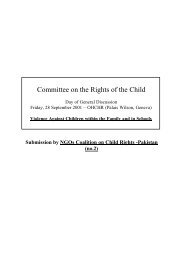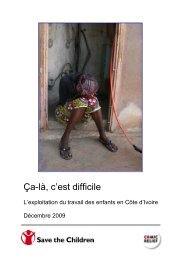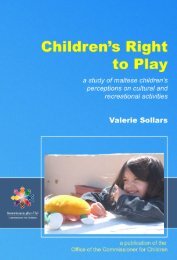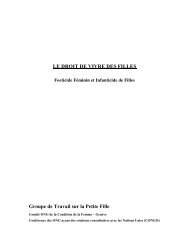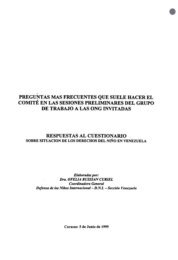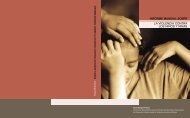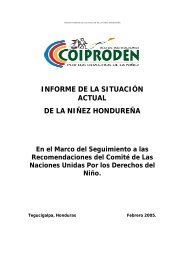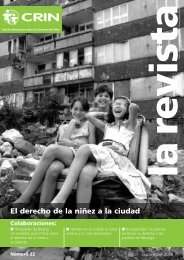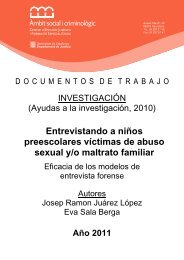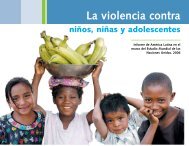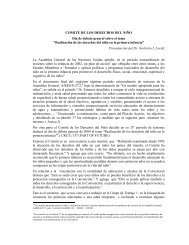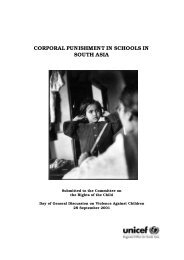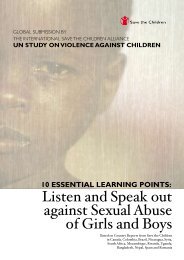Universal Periodic Review: The Status of Children's Rights - CRIN
Universal Periodic Review: The Status of Children's Rights - CRIN
Universal Periodic Review: The Status of Children's Rights - CRIN
You also want an ePaper? Increase the reach of your titles
YUMPU automatically turns print PDFs into web optimized ePapers that Google loves.
Child <strong>Rights</strong> Information Network (<strong>CRIN</strong>) NGO Survey Findings<br />
3. Opportunity to develop external relationships<br />
A number <strong>of</strong> organisations commented on the external impact <strong>of</strong> the UPR, with regards to the opportunity the<br />
mechanism provides for NGOs to network with other children's rights NGOs and indeed wider human rights focused<br />
organisations. This appeared particularly crucial for small national NGOs who felt cut <strong>of</strong>f and limited by capacity. <strong>The</strong><br />
chance to join coalitions and build alliances within the human rights community proved a crucial aspect <strong>of</strong> the UPR,<br />
particularly in countries that have few children's rights NGOs or advocates. <strong>The</strong> fact the UPR incorporates all human<br />
rights issues and hence organisations, proved a key opportunity for smaller children's rights focused NGOs.<br />
4. Opportunity to develop Internal relationships<br />
A couple <strong>of</strong> organisations, mainly international NGOs, talked about the internal impact the UPR process had on their<br />
organisations, in terms <strong>of</strong> building relationships between the head <strong>of</strong>fices and the country <strong>of</strong>fices, particularly where<br />
country <strong>of</strong>fices are receptive to engaging with the UN mechanisms. One international NGO commented on how the<br />
UPR had enabled their organisation to develop closer ties with their South American country <strong>of</strong>fices, a region where<br />
they found their colleagues to be particularly open to engaging with a new UN mechanism.<br />
Reasons against the UPR<br />
1. Hard to tell if you are making a difference<br />
One international NGO stated:<br />
“With lots <strong>of</strong> NGOs working together, it is hard to tell if as an individual NGO you are making a<br />
difference”<br />
2. <strong>The</strong> UPR is a labour intensive process<br />
A number <strong>of</strong> organisations raised the issue <strong>of</strong> the amount <strong>of</strong> time and work required to report to the UPR, and indeed all<br />
UN treaty mechanisms. This issue was particularly stressed by national and local NGOs or country <strong>of</strong>fices <strong>of</strong><br />
international NGOs (though country <strong>of</strong>fices <strong>of</strong>ten receive support and assistance from their Geneva <strong>of</strong>fices). Some<br />
organisations also commented on the issue <strong>of</strong> reporting to a new mechanism with new guidelines, as mentioned earlier<br />
in the chapter.<br />
3. Issue <strong>of</strong> political bargaining<br />
Whereas some organisations clearly viewed the political nature <strong>of</strong> this inter-State mechanism as a positive influence and<br />
an opportunity to push States by lobbying other States, other organisations were less convinced by the political nature,<br />
<strong>of</strong>ten suggesting that States bargain and compromise with each other to maintain inter-State diplomacy. Some<br />
organisations interviewed were extremely sceptical about the process <strong>of</strong> States questioning other States and<br />
subsequently place little emphasis on this lobbying approach.<br />
50



